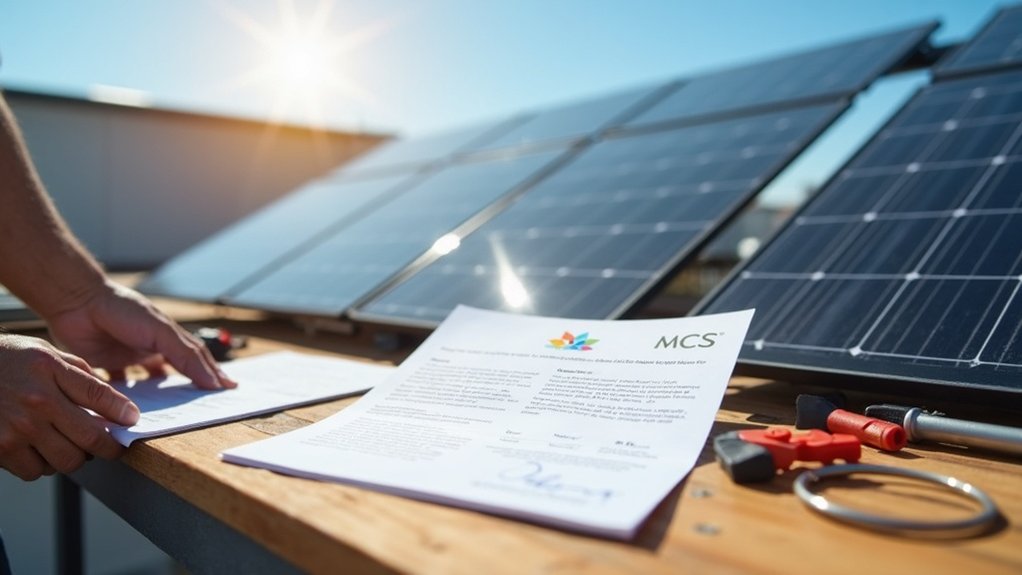To get an MCS certificate for your DIY solar system, you must use MCS-certified products installed after July 15, 2009, and then have the entire system commissioned by an MCS-certified installer who inspects and confirms compliance with scheme standards. The certified installer submits documentation, ensuring safety and performance criteria are met, and issues the certificate within 10 working days. This certification also qualifies you for financial incentives like the Smart Export Guarantee. Exploring further will clarify each important step involved.
Understanding MCS Certification and Its Requirements
MCS certification serves as a key benchmark for ensuring that DIY solar installations adhere to established quality, safety, and performance standards under the Microgeneration Certification Scheme, which has been in place since 2007. To qualify, your installation must be completed by certified installers using MCS-certified products, with the installation date after July 15, 2009. The certification process involves regular audits and testing to verify compliance with safety regulations and performance criteria, ensuring reliability. Although not mandatory, obtaining MCS certification grants access to financial incentives like smart export tariffs, potentially earning you around £343 annually. Additionally, MCS standards require a Quality Management System and skilled employees, which means you can trust that installations meet high competency levels, reinforcing the overall quality and safety of your solar setup. It is important to engage MCS-certified installers to ensure your installation meets all necessary standards and can be certified.
Selecting MCS-Certified Solar Products for Your System
How do you guarantee that your solar installation meets the stringent quality and safety benchmarks necessary for long-term efficiency? Start by selecting MCS-certified solar products, as these have undergone rigorous testing to confirm safety, performance, and reliability. Only products certified after 15 July 2009 qualify for MCS recognition, so verify certification dates before purchase. Using certified components not only assures compliance with standards set by the Microgeneration Certification Scheme but also enables you to access financial incentives like the Smart Export Guarantee. With over 3,300 installers and numerous products certified under MCS as of January 2024, choosing certified equipment reflects a commitment to quality renewable energy solutions. This selection process is essential for a durable, efficient DIY solar system that meets regulatory requirements. Ensuring your system uses Monocrystalline panels can also improve efficiency and long-term performance.
Commissioning Your DIY Solar Installation With a Certified Installer
After choosing MCS-certified solar products, the next step involves having your DIY solar installation commissioned by an installer who holds MCS certification. This process verifies that your system meets quality and safety requirements established since 15 July 2009. The certified installer assesses the installation, confirms compliance, and issues the MCS certificate within 10 working days, facilitating access to financial incentives such as the Smart Export Guarantee. Using a non-certified installer risks warranty invalidation and loss of benefits. The Smart Export Guarantee offers payments for surplus electricity exported to the grid, supporting your potential earnings from your solar installation Smart Export Guarantee.
| Requirement | Importance |
|---|---|
| MCS-certified installer | Guarantees compliance and safety |
| MCS-certified products | Mandatory for certification |
| Installation date post 15 July 2009 | Qualification criterion |
| Certificate issuance timeframe | Within 10 working days |
| Financial incentives eligibility | Up to £343 annually via SEG |
Applying for and Receiving Your MCS Certificate
Because certification depends on meeting specific standards, you’ll need to guarantee your solar installation uses approved products and complies with all scheme requirements before applying for the certificate. Verify your installation employs MCS-certified equipment and adheres to regulations established since July 15, 2009. You should keep all documentation verifying compliance with these standards. Typically, your certified installer handles the application and must issue the MCS certificate within 10 working days after commissioning the system. If you completed the installation yourself, consider hiring a certified installer to inspect it, facilitating the certification process and confirming safety and performance standards. While MCS certification isn’t mandatory, obtaining it is vital for accessing financial incentives like the Smart Export Guarantee and assuring the quality and reliability of your solar installation.
